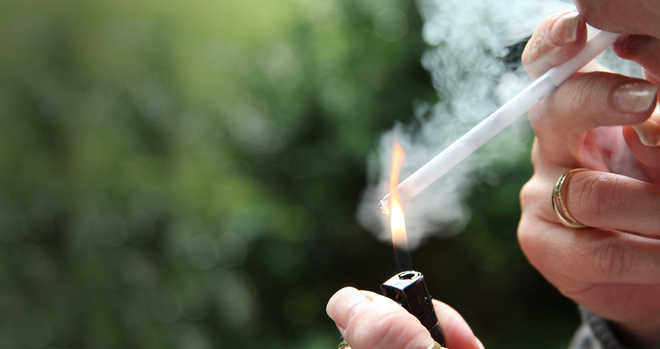
Dr Kanchi Khurana
With more than 11 per cent of world’s total smokers, India is one of the three leading countries with both male and female smokers. While smoking remains a leading risk factor for death and disability, and can damage lungs, heart, kidneys and many other organs, it has also emerged as a major factor behind infertility in both men and women.
Several studies have shown that active smokers have 14 per cent more chances of suffering from infertility in comparison to non-smokers, while among women smokers there are 30 per cent more chances of an early menopause.
Infertility among women
According to some studies, approximately one in four women in the metro cities is addicted to smoking. The number of couples facing problems in conception is rising. Smoking is also one of the leading causes of early onset of menopause among women.
After thirties, there is a gradual decline in fertility. The process speeds up after 35, but tobacco abuse triggers it well before the time.
Chemicals present in a cigarette are responsible for some cervical changes that put women smokers at an elevated risk of cervical cancer. Smoking is also linked to miscarriage, ectopic pregnancy and tubal infertility. Regular smoking also creates an imbalance in the antioxidant levels in the ovaries that prevents fertilisation and hence implantation.The women, who are active smokers, reduce their chances of conceiving by at least 60 per cent. Smoking during pregnancy raises the risk of complications, low birth weight and birth defects.Passive smoking is only slightly less harmful to fertility than active smoking.
Loss of fertility in men
Tobacco has a massive problematic effect on male fertility as well. It damages blood vessels and affects blood flow. Some studies have linked smoking with erectile dysfunction and decreased sexual performance among men.
Human sperm cells carry two tiny, highly charged proteins called protamine 1 and protamine 2 which are in a perfectly balanced one-to-one relationship. However, sperms of a smoker carry very little protamine, which makes them highly vulnerable to DNA damage.The harm done on the sperm is more intrinsic and critical in nature, as the tobacco also damages chromosomes and DNA fragmentation. It distorts the sperm turning it infertile. There is an equal impact on the partner as well at the same time, as the embryos developed from a smoker's eggs are less likely to survive due to DNA damage.
Passive smoking may also affect male fertility. Male smokers can suffer decreased sperm quality with lower mobility and it boosts numbers of abnormally shaped sperms. Also, if one is a chain smoker then it might also decrease the sperm's ability to fertilise eggs.
In vitro fertilisation (IVF) also may not be able to fully overcome smoking effects on fertility. Female smokers need more ovary-stimulating medications during IVF and still have fewer eggs at retrieval time and have 30% lower pregnancy rates compared with IVF patients who do not smoke.
Couples opting for procedures like IVF may also not be able to fully overcome smoking effects on fertility. In case of women smokers opting for fertility treatments like IVF, they need more ovary-stimulating medications during the procedure and still have fewer eggs at retrieval time. They also have 30 per cent lower pregnancy rates compared with IVF patients who do not smoke.
Take the best decision, together
If a couple is planning for a child it is good to quit smoking for both partners much earlier. Studies say more than 10 cigarettes a day will significantly harm a person’s fertility. For a healthy life maintain a balanced diet, do regular exercise, meditation, yoga, etc. Research says that if a couple decides to quit together it is much easier for them. Quitting smoking can improve natural fertility and some of the harms can be reversed within a year of stopping and improve chances of having a healthy baby and reduces risk of premature and low-birth babies.
— The writer is gynaecologist & IVF expert, Indira IVF Hospitals, Chandigarh



























